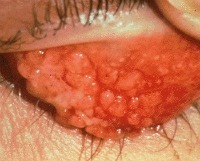|
What is Causing Giant Papillary Conjunctivitis?
Have you suffered from excessive itching of the eyes associated with increased lens awareness when wearing your contact lenses? Have you noticed that your contact lenses are moving more in your eyes with blinking and are uncomfortable? Have you noticed white, stringy discharge from your eyes? You may have giant papillary conjunctivitis (GPC). Giant Papillary Conjunctivitis is a common immune response, which was among the first complications of soft contact lens wear to be recognized. This condition can also occur with rigid gas permeable lenses, ocular prostheses and even focally as a result of exposed sutures following eye surgery. What is causing this Giant Papillary Conjunctivitis?
The precise cause of Giant Papillary Conjunctivitis remains unclear, but it is understood to be most likely the result of a combination of allergic and mechanical factors. The affected tissue is the conjunctival tissue lining the inner eyelid (i.e., the conjunctiva in direct contact with the eyeball). The mechanical rubbing of a deposited soft contact lens, a rigid contact lens, ocular prosthetic or exposed suture can cause the tissue reaction. An allergic response to a particular plastic material or a contact lens solution can compound the problem What happens to this part of the eyelid with Giant Papillary Conjunctivitis?
The conjunctiva develops papillae, usually greater than 0.3 mm in size. These papillae look like vascularized bumps on your inner lids. Papillae are collections of lymphocytes and plasma cells. They are best viewed by your eye doctor by flipping your eyelids and viewing their surface under the slit lamp. The slit lamp is like a “microscope” to help view small structures under magnification. The issue may also appear red as shown below.
What are the symptoms of Giant Papillary Conjunctivitis?

Affected patients typically complain of: Does this mean I cannot wear contact lenses anymore?
No. At first, just replacing a deposited lens may be enough to quiet down the reaction. However, Giant Papillary Conjunctivitis will recur, each time with a shorter latency than before. If you have GPC, it is especially important for you to be diligent about cleaning and disinfecting your contact lenses. Proteins found in tears can aggregate and deposit on the contact lens surface. As you blink, these deposits rub against the sensitized conjunctiva, worsening your GPC symptoms. For this reason, you should purchase a separate daily cleaner to digitally rub your contact lens surface. After rubbing your lenses place them in a peroxide disinfecting solution to ensure maximum disinfection. If the reaction is severe, discontinue contact lens wear for a time to allow healing of the tissue. Visit your eye doctor for further treatment. Once you resume contact lenses, you may want to reduce your wearing time, or stop sleeping in your contact lenses if you have been doing that. Another option you have is to use daily disposable contact lenses, which are not susceptible to contact lens surface deposits like conventional lenses or disposable contact lenses. If you are a rigid contact lens wearer, you may need to be refitted or change your cleaning regimen. In the case of ocular prostheses, cleaning becomes primary in managing the condition. Perhaps taking your ocular prostheses in for modification may help the mechanical part of the issue. Finally, return to your ocular surgeon if you have mucus discharge in your tears and itchy eyes after surgery because exposed sutures may be at fault. What other treatment options are available for Giant Papillary Conjunctivitis?
Many people buy over-the-counter (OTC) decongestants in order “to get the red out” or antihistamine eye drops for relief of itchiness. The problem with OTC decongestants and antihistamines is that they treat the symptoms without addressing the cause of the allergic reaction. For this reason, their effect is temporary. Eye decongestants are similar to nasal decongestants, and can result in dependency on these drops in order to keep the eyes white. When the person tries to stop using the drops, a rebound effect can occur where the eyes are actually redder than usual for a time. These drops are not recommended to be used in any long-term manner. For moderate GPC your eye doctor may prescribe a course of steroids to combat the immune response. It is best if you discontinue contact lenses while using steroid eye drops. The steroid drops will first be used more frequently, and as the eye signs and symptoms improve, you should wean yourself off the steroids slowly. Your eye doctor will give you a weaning schedule. You may also be put on a mast cell stabilizer, which goes to the underlying allergic reaction and stops it at its source. |




